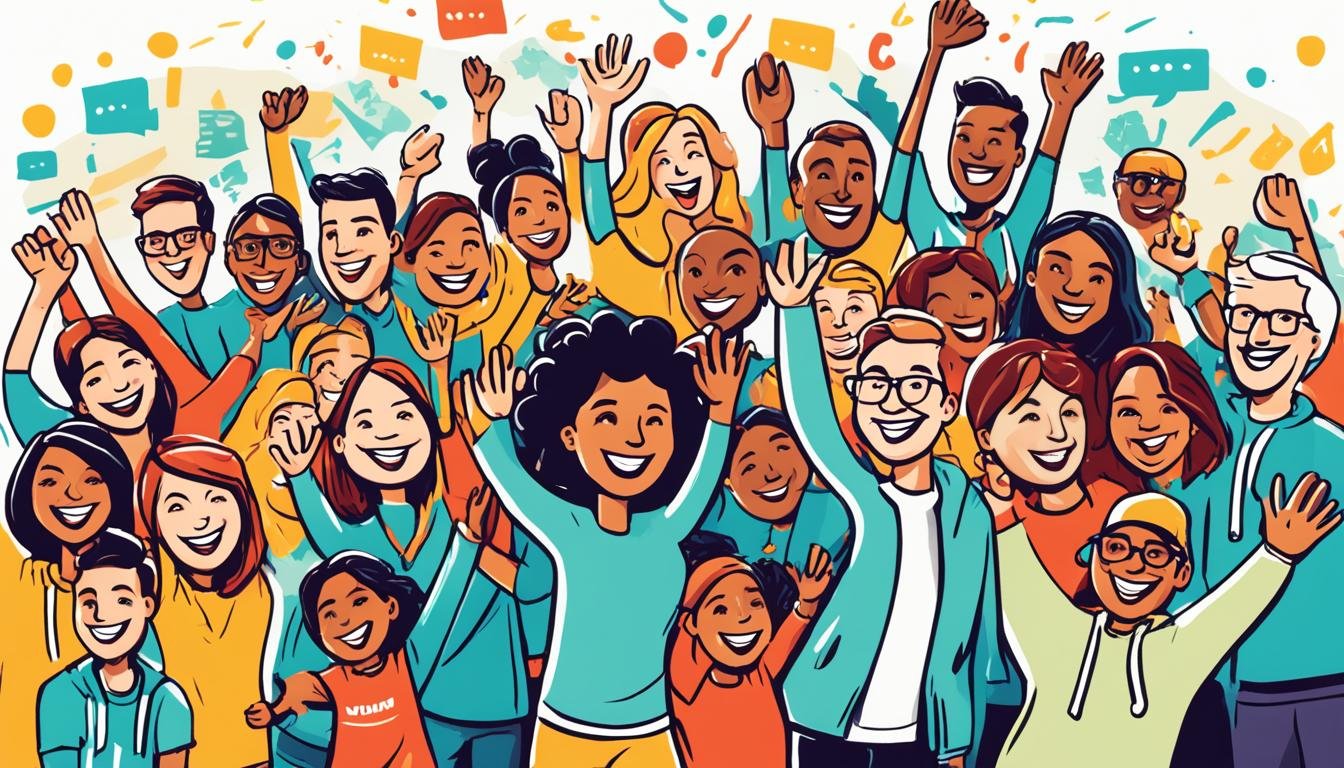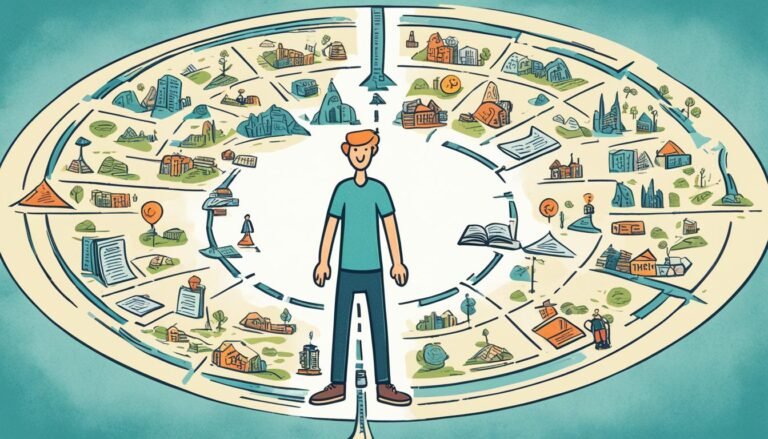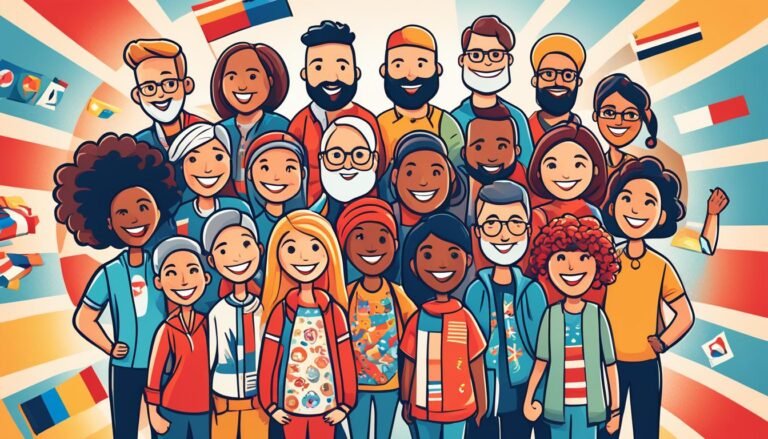Empowering Others: Elevating Communities through Support and Encouragement
“Alone we can do so little; together we can do so much.” – Helen Keller
Welcome to exploring how empowering others transforms lives. In today’s world, focusing on personal success is common. But, it’s equally important to realize the power of helping and cheering others on. This leads to personal growth and closer, stronger communities. By boosting others, entire communities rise, starting a chain of positive improvements.
Key Takeaways:
- Empowering others plays a crucial role in building stronger and more supportive communities.
- Support and encouragement are essential in fostering personal growth and leadership skills.
- By empowering individuals, we create a ripple effect of positive change.
- Personal and community empowerment go hand in hand.
- Together, we can achieve far more than we can alone.
Understanding the Power of Empowering Others
Empowering others goes beyond kindness; it sparks real and lasting change. By giving people tools and confidence, we’re helping them steer their lives. They not only better themselves but also uplift their communities. This process helps everyone grow and move forward together.
When we inspire others, we’re tapping into their own hidden strengths. Feeling supported and valued encourages people to dream big and tackle challenges. It sets off a purpose-driven journey marked by resilience and unwavering determination. Empowering lifts spirits and drives people forward.
A critical part of empowerment is understanding that power grows when shared. It’s not about holding power over others but about building a web of support. This web unites individuals in their community to achieve common goals. Helping others succeed means we all succeed.
“Empowering others is not a one-time act, but an ongoing process of support, guidance, and belief in their potential.”
Empowering is an ongoing commitment. To truly empower someone, we must listen, show empathy, and understand their needs. This approach builds a culture based on trust and teamwork. It’s a journey where we support each other to thrive.
The Power Within Each Individual
Empowerment recognizes each person’s unique ability to make a difference. It encourages them to trust their own voice and strengths. Through this, they are better equipped to face life’s hurdles and achieve their dreams.
The moment an individual realizes their own potential, the effect is incredible. They become catalysts for positive change that spreads to others. This act of empowerment creates an unstoppable wave of growth and happiness.
Leadership Development: Nurturing Strong and Effective Leaders
Leadership development is key to helping others and building a culture of success. It’s vital for bringing about positive changes and motivating others.
Developing leaders means giving them the skills and knowledge to lead. They learn to make good decisions, think strategically, and solve problems. With these tools, leaders can face challenges and lead their teams to victory.
Building self-awareness and emotional intelligence is crucial for leaders. This means knowing their strengths and weaknesses. It helps them lead in a real way and connect deeply with their teams. Emotional intelligence builds trust, improves communication, and makes a supportive workplace.
“Effective leaders are not born; they are developed through deliberate practice and continuous learning.” – John Maxwell
Leadership development also means offering chances to grow and learn. Mentorship, training, and collaboration let leaders build new skills and see things differently. This boosts innovation and flexibility, helping leaders face new challenges.
It’s important to spot and nurture leadership potential. By finding upcoming leaders, organizations can offer special chances and support. This ensures the future leaders have what they need to succeed and make a difference.
Investing in Leadership Development
Organizations that focus on developing leaders see many rewards. They get a strong lineup of leaders ready for the future. Good leadership programs also make the workplace positive and motivating.
Leadership programs must cater to each person’s needs and fit with the organization’s aims. These investments empower leaders and bring about positive changes. They inspire others to do their best too.
Leadership development is a journey that takes time, effort, and resources. It’s about commitment to growing and supporting leaders. This way, organizations can lay a strong foundation for success. They nurture a community of leaders that bring out the best in their teams and communities.
Mentoring and Coaching: Guiding Others towards Success
Both mentoring and coaching are strong tools for helping others succeed. They give support and show the way, helping individuals grow. With advice and experience from mentors and coaches, people learn new skills and find success strategies. This way, everyone can reach their full potential.
Mentoring is about a mentor sharing their knowledge and advice with someone less experienced, called a mentee. Mentors are like guides, showing the way and giving support. They help their mentees face challenges and reach their goals.
Coaching is more structured. Coaches help people understand their strengths and weaknesses. Then, they work together to create clear goals and plans to improve. With regular feedback and personalized advice, coaches help individuals grow in their personal and work lives.
“The mentor’s role is not to provide all the answers, but to ask the right questions that guide the mentee towards self-discovery and growth.”
Mentoring and coaching do more than help individuals. They also boost entire communities. As people become more skillful and confident, they inspire change in others. This cycle of support and growth benefits everyone.
Mentoring and coaching build a culture where everyone keeps growing and learning. It’s a place where success is shared and challenges are seen as chances to get better.
When mentors and coaches give their time and wisdom, they make their communities better. Building strong connections and passing on knowledge helps everyone succeed. It inspires those who were helped to help others in turn.
Benefits of Mentoring and Coaching:
- Personalized guidance: Mentoring and coaching provide help that’s specific to each person’s needs and goals.
- Accountability: Mentors and coaches make sure individuals keep moving forward, keeping them focused and motivated.
- Networking opportunities: These relationships can introduce people to new contacts and resources, opening up more chances for success.
- Accelerated growth: With the help of mentors and coaches, individuals can grow faster personally and professionally.
- Increased self-confidence: They offer the support and cheerleading that boosts confidence and helps people fight self-doubt.
Mentoring and coaching are key to helping others succeed. By supporting these actions, we can encourage growth, help, and teamwork. This leads to the success of people and communities all around us.
The Power of Inspirational Speaking
Inspirational speaking can truly lift and empower people. Speakers use their words to create change. This could be at a TED talk, a big event, or through a personal story. Their message has the power to change lives, inspire, and lift spirits.
Sharing their own stories helps speakers connect with their audience. Stories about facing hard times and then succeeding are especially moving. These tales can encourage us to aim higher and go after our dreams.
“Inspirational speaking is like a beam of light that penetrates the darkest corners of our minds, illuminating our potential and empowering us to reach new heights.” – John Maxwell, Leadership Expert
Successful inspiring speeches depend on both the message and how it’s delivered. By telling engaging stories and using strong examples, speakers capture their audience. They know how to get people’s attention and inspire them to act.
This kind of speaking isn’t just for stage performances. It can be a big help in business or personal growth settings. Good speeches can change our thinking, boosting our drive and confidence. They encourage us to believe in ourselves and chase our goals.
The Power of Words
Words are influential, shaping what we believe. Spoken from the heart, they can light a fire in us. They help us grow and find our power.
Inspirational speeches don’t just pump us up. They give us the mental tools to face life’s hurdles. They show us our own potential and call us to take brave steps. This can make a big difference in our personal journeys.
If you aim to inspire, whether as a speaker or a leader, remember the strength of your words. By using them wisely, you can help change lives and guide others towards growth and self-belief.
Emotional Intelligence: A Key to Empowering Others
Emotional Intelligence (EI) is crucial for helping others succeed. It’s more than just understanding and controlling emotions. EI is about the power to feel for others, talk well, and make strong bonds.
High emotional intelligence lets us pick up on how others feel. This helps us react with kindness, offering the help people need to grow.
When we work on our EI, we build trust and respect. These are key for supporting others. A safe space is created where everyone can share their feelings. This makes people feel cared for and understood, starting their journey to empowerment.
“Empathy is the cornerstone of emotional intelligence. It is the ability to put yourself in someone else’s shoes, to understand their perspective, and to provide the support they need.”
To be emotionally intelligent, we need to know ourselves and control our reactions. This way, we inspire others by showing strength during tough times. Our positive attitude helps make a space where everyone can face challenges with hope.
Emotional intelligence also makes us better at talking and understanding others. When we share our feelings well, it builds strong connections. This is key for supporting and encouraging others effectively.
Fostering Emotional Intelligence
Getting better at emotional intelligence takes work. It means looking at yourself honestly, practicing empathy, and staying mindful. Here are some steps to become more emotionally intelligent:
- Think about your own feelings and what makes you react. This helps understand others better.
- Listen without judging and try to see things from others’ points of view. It helps build trust and connections.
- Control how you show your feelings. Doing this in a positive way can make the environment better for everyone.
- Work on how you speak and listen. Good communication, both words, and body language, is essential for helping others.
Becoming more emotionally intelligent helps individuals and communities. It promotes empathy and teamwork, which leads to growth and support for everyone.
Motivational Techniques: Igniting Passion and Drive
Empowering others involves using powerful motivational techniques. These methods can light a fire under people, making them want to reach their goals and be their best.
Setting hard, clear goals is a great way to motivate. These goals show the way forward and give a clear purpose. They also push individuals to work harder than they have before, stepping out of their comfort zones.
Creating a positive atmosphere is another key. Encouragement and positive feedback can build their confidence. This makes people feel like they belong and are valued, leading to more passion for their tasks.
It’s crucial to know what drives each person. Not everyone is motivated the same way. By understanding what motivates someone, you can use that to light the fire inside them. This personal touch is very powerful.
Telling inspiring stories works too. Stories of people who faced challenges and won can move others. They connect emotionally to these tales, feeling inspired to show the same determination.
Celebrating milestones and accomplishments
It’s very important to celebrate successes. Doing so shows people the value of their work. It encourages them to keep trying hard and helps boost their confidence.
Using the right motivational tools is how you help others reach their full potential. Remember, motivation is personal. The best way to inspire is to address each person’s unique drive. This can set off powerful changes, inspiring others to dream big.
“Motivation is the fuel that drives individuals to greatness. By strategically employing motivational techniques, we can unlock the boundless potential within ourselves and others, igniting a fire that propels us towards success.”
This image shows the importance of constant motivation and passion. Using the right techniques is the spark that sets off achievements. It helps individuals move steadily towards their aims.
Personal Growth: Empowering Individuals from Within
In the journey of empowering people, personal growth is key. It involves looking at yourself, learning, and facing challenges. These actions help people find their true abilities and become forces for good.
Self-reflection is like a guide in personal growth. It helps people understand who they are and change for the better. When people think about their thoughts and actions, they learn a lot about themselves.
Learning all the time is also important. It means getting more knowledge, skills, and seeing the world in new ways. This helps people be better in different parts of life.
Facing challenges is also a big part of growing personally. By overcoming hard times, people get stronger and learn to solve problems well. Challenges push people to go beyond what they think they can do, showing them their real strengths.
“Personal growth is not just about acquiring knowledge or skills; it is about the transformation of the self. It is the journey of becoming the best version of oneself and empowering others along the way.”
Seeking personal growth helps people have control over their lives. It encourages making choices that are good for them and others. This leads to more self-belief and a desire to help make the world a better place.
Remember, “Be the change you want to see in the world.” By working on yourself, you can inspire others and spread empowerment. This makes a lasting impact on the lives of many.
Building Strong Teams: Collaborative Empowerment
Creating strong teams is key to empowering and fostering a supportive climate. Such teams achieve incredible outcomes, using their full potential. They add to the success of projects or companies. By following empowerment strategies, teams build trust, share openly, and support each other.
One way to build strong teams is to promote working together. It empowers team members to share thoughts and skills. This enhances innovation and their ability to solve problems, using different points of view to the team’s advantage.
Trust is crucial in team building. When there’s trust, team members are open, take chances, and can be themselves. This leads to honest talks, solving conflicts effectively, and building a solid team environment.
“Working together as a team allows us to pool our strengths, compensate for individual weaknesses, and achieve remarkable outcomes that surpass what we could achieve individually.”
Mutual support is just as vital. When team members help and cheer each other, they overcome hurdles and reach their best. This builds unity, making everyone feel valuable and ready to share their unique talents.
Cultivating a Collaborative Team Dynamic
- Set clear goals and objectives: This provides focus and purpose. Team members align toward a shared vision, boosting collaboration and accountability.
- Promote constructive feedback: Make giving and receiving feedback a positive experience. It fosters learning among team members, improving skills.
- Recognize and celebrate achievements: Celebrating wins boosts morale and shows the power of working together. It maintains motivation and a positive team spirit.
Adopting these approaches builds empowered teams that strive for excellence. Collaborative empowerment drives innovation, creativity, and growth. It makes teams and organizations flourish.
The Power of Positive Reinforcement
Positive reinforcement is a key in helping others. It boosts motivation and helps people grow. By praising achievements, we make the world more positive. This helps boost confidence and the community feels stronger.
Praising someone’s skills lifts them up. It shows they can do great things. This positive push reminds people why their work matters. It keeps them going even when things get tough.
We can show positivity in many ways. One common way is to say “good job” with feeling. This makes people feel appreciated and keeps their spirits high.
Giving out rewards is also effective. A reward for a job well done keeps people aiming high. It might be a prize or a simple thank you. They all say, “Your hard work is noticed”.
“Positive reinforcement is not only about celebrating achievements, but it’s also about creating a supportive and empowering environment where everyone has the opportunity to thrive.” – Maya Smith
Setting a good example with how we treat others is powerful. When we cheer for other’s successes, we encourage everyone. This spreads happiness and motivation in our circles.
Positive reinforcement changes how we act and think. It builds confident, hardworking people who better society. Using it in daily life makes a big difference.
Cultivating Empowered Communities
Creating empowered communities is key to both personal and group growth. We’ve talked about principles and strategies to empower others. Now, let’s see how to use these to build strong, empowered communities.
Empowerment starts with individuals. But its effect grows when people join forces. By combining our strengths and resources, we lay a solid base for empowered communities.
Creating a culture of teamwork and inclusivity is crucial. When everyone feels valued and included, they’re more eager to help the community grow. This means talking openly, welcoming all views, and making everyone feel they belong.
Community leaders and influencers have a big part in empowering others. They motivate by example, showing how to own our power. They can offer chances for progress, guide and teach, and help connect community members.
It’s also important to offer resources and chances to grow personally. This might involve classes, workshops, and events. These help people learn new skills, gain confidence, and reach their full potential.
Empowering communities is not a straight path; it takes ongoing work and being ready to change. It’s about handling hurdles and welcoming progress. With support and inclusion, a community becomes a place where everyone can succeed together.
Developing empowered communities is an ongoing effort for every member. Working together, we make spaces where each person can fulfill their goals, beat challenges, and positively influence society.
Fostering Empowered Leadership
Another vital part of empowered communities is having strong leaders. When leaders are themselves empowered, they can inspire others to reach their highest potential.
Empowered leaders listen well and understand the community’s needs. They provide chances for growth. They also foster teamwork and recognize each individual’s unique value.
By raising more empowered leaders, communities keep their empowerment spirit alive. Empowered leaders don’t just lift their communities; they also drive broader societal change.
- Foster empathy and active listening skills.
- Encourage collaboration and teamwork.
- Provide mentorship and guidance.
- Recognize and celebrate individual achievements.
- Empower others to take on leadership roles.
Building empowered communities involves everyone’s commitment and cooperation. This way, we can make places where people are empowered to create positive changes that last.
Conclusion
Empowering others is crucial for building strong, supportive communities. We’ve looked at ways to bring about this change. By supporting and motivating others, we help them grow and become effective leaders.
Mentoring, coaching, and inspirational speaking are key. They guide people to success and light a fire in them. Paying attention to emotional intelligence and personal growth boosts inner strength. This helps people face challenges and achieve more.
Working in strong teams and using positive feedback is also important. It builds cooperation, trust, and a culture of empowerment. Together, we can create communities where everyone thrives and supports each other. It’s on all of us to join in and make a difference. Let’s aim for a world where all can meet their goals and improve society.








